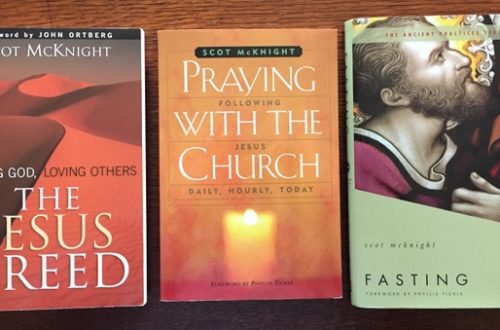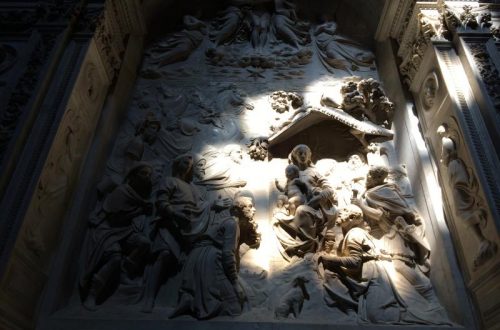
God Makes Ugly Beautiful
Isn’t springtime delightful? The landscape seems to go from ugly and barren to beautiful as new life emerges. Practically every day, I go outside to my garden, pushing aside dried leaves to see what is coming back up from the ground after the cold winter. The contrast from the ugly barrenness of winter to the beauty of new life emerging in the spring inspires worship. Easter belongs in the spring, doesn’t it? Spring reminds us that God makes ugly beautiful.
One Friday, almost 2000 years ago, something very ugly happened. Jesus, the sinless God-man who walked among us people, was hung on a cross to die. The beautiful son of God experienced the ugliness of sin and took on its punishment. He did that for us!
As the spring storms hit my area a few years ago, I realized that our house took on the punishment of the 70 mile-per-hour winds for Ron and me. My friends’ houses took on the punishment of the softball-sized hail for them. Without the interceding of our houses, we could easily be dead. What our houses did, Jesus did for us when He took on the punishment for our sin in our place. In the ugliness of that moment, we were preserved. My heart is filled with joy and gratitude.
The agony and disgrace of crucifixion
Psalm 22 poetically describes the agony and the disgrace that Jesus experienced during his crucifixion. The Romans didn’t invent crucifixion although its infamy is associated with the Roman Empire because of Christ. Crucifixion was adopted from the Greeks and then used by the Romans as their severest form of execution, mainly for rebellious slaves, thieves, and other criminals, but also for anyone guilty of rebellion and treason. Roman citizens could not be executed by crucifixion. Jesus was not a Roman citizen.
If you’ve seen any movie portraying the life of Christ, you have an idea of how a crucifixion was likely done. The crucified victim hung by his outstretched arms attached to the crossbeam. Usually heavy wrought-iron nails were driven through the wrists and the heel bones (Psalm 22:16). As the victim hung dangling by the arms, the blood could no longer circulate to his vital organs, and he felt like he was suffocating. His bones would get out of joint (Psalm 22:14). The victim would sweat profusely and be thirsty (Psalm 22:15). Sometimes wood was nailed to the main post as a sort of seat. Only by supporting himself on this or by pushing against the nails in his feet could the victim lift himself up to gain any relief. Then exhaustion set in, and death followed, although sometimes not for several days. To hasten death, the victim’s legs were broken with a club so he couldn’t keep pushing up to stay alive. The fact that Jesus’ bones were not broken fulfilled another prophecy. Psalm 22 is a graphic picture of the agony of death by crucifixion that Jesus experienced on the cross.
Then, there’s the disgrace caused by humiliation of public execution as a criminal, being stripped, then left to die and be eaten by scavengers. See how closely the words in Psalm 22:6-8 match what the crowd actually said to Jesus (Matthew 27:40-44). And the casting of lots was literally fulfilled (Psalm 22:18). I doubt that neither the Jews nor the Romans were trying to fulfill Psalm 22 that day. Only God the Holy Spirit inspiring David to write those words 1000 years earlier could ever explain how closely they match the day Jesus died. Crucifixion was God’s plan.
Why the cross?
Why the cross? After all, the usual method for Jewish execution was death by stoning. And, the sacrificial lamb was bled and burned. Could Jesus have paid the penalty for our sin through another means of execution? Yes. But, the cross was there, it was predicted, and neither Jew nor Gentile (anyone who wasn’t a Jew) would have thought of it as an acceptable plan for salvation. And, crucifixion provided the best scenario for Jews and non-Jews alike because both groups participated in the sinful act of executing God’s Son. See what Peter in Acts 2 clearly tells the Jews.
This man was handed over to you by God’s set purpose and foreknowledge; and you (Jews), with the help of wicked men (Gentiles), put him to death by nailing him to the cross. (Acts 2:23)
It was God’s plan for His Son to die on that cross for all of humanity’s sin. No human would ever come up with that plan. Accepting it requires faith alone. Exactly what God wanted. In 1 Corinthians 1, the apostle Paul sums it up best,
We preach Christ crucified: a stumbling block to Jews and foolishness to Gentiles, but to those whom God has called, both Jews and Greeks (Gentiles), Christ the power of God and the wisdom of God. (1 Corinthians 1:23-24)
To the Jewish people, crucifixion represented the most disgusting form of death, yet the Jewish leaders back then sought and obtained Roman authorization to have that very thing done to one of their own. No self-respecting Messiah would ever get himself hung on a cross. For the Roman or the Greek or any other non-Jew, following a religious leader who showed such weakness would be absolute foolishness. We think nothing of it now after 2000 years of Christian teaching. Of course, God came to earth as a man to die on the cross as a ransom for many. But, to them, the cross represented humiliation and shame.
The Greek mind pursued knowledge and education and the highest wisdom of their world. That was what elevated anyone above criminals and the despised poor. Our cultural emphasis on academics can produce the same kind of puffed-up mindset. But to those of us who recognize the ugliness of our sin before God and the hopelessness of our efforts to please Him, the message of the cross is amazingly powerful.
In his book “Paul, the Apostle of the Heart Set Free,” F. F. Bruce wrote this:
But as Paul persisted in preaching Jesus as the crucified Savior and sin-bearer, the unexpected happened: pagans, as well as Jews and God-fearers, believed the message and found their lives transformed by a new, liberating power, which broke the stranglehold of selfishness and vice and purified them from within. The message of Christ crucified had thus accomplished something which no body of Greek philosophic teaching could have done for them.
F.F. Bruce, Paul, the Apostle of the Heart Set Free, page 253
Isn’t that so true? We can’t think ourselves out of the ugliness of our sin. Every bit of our sin is so ugly to God. As ugly as the most heinous crime you can think of. As ugly as the crucifixion. But, our redemption is absolutely beautiful. God’s in the business of making ugly beautiful.
My favorite hymn is “In Christ Alone.” The words are pure gospel put to song. The second verse reads:
In Christ alone! who took on flesh, Fulness of God in helpless babe! This gift of love and righteousness Scorned by the ones he came to save: Till on that cross as Jesus died, The wrath of God was satisfied – (YES!) For every sin on Him was laid; Here in the death of Christ I live.
Stuart Townend, “In Christ Alone”
Here in the death of Christ, I live because He didn’t stay dead. Jesus isn’t still on the cross. Nor is he in the grave. Jesus was resurrected from the dead, declaring that the debt for sin has been paid and accepted. And, our need for deliverance from death has also been answered. We get Jesus’ life.
The beauty of Christ’s life in me
Two types of death result from humanity’s sin—spiritual and physical. Jesus’ resurrection solved both. Because of His resurrection, from the moment we trust in Jesus, we get eternal spiritual life now and the promise of eternal physical life when Christ returns.
God’s solution to our spiritual death is to restore spiritual life to anyone who believes. That’s called regeneration. Believers are cleansed and made new creations of life when God plants His Spirit within us. We are made alive. That’s what it says in Colossians 2:
When you were dead in your sins and in the uncircumcision of your sinful nature, God made you alive with Christ. He forgave us all our sins, having canceled the written code, with its regulations, that was against us and that stood opposed to us; he took it away, nailing it to the cross. (Colossians 2:13-14)
We are made alive as Christ is alive. That’s beautiful. God gives us eternal spiritual life from the moment we believe, and we have complete acceptance before a holy God by faith alone. That which stood against us, ugliness of our sin, is gone. Christ’s life is given to us, living in us. This is so beautifully expressed in the third verse of “In Christ Alone”:
There in the ground His body lay Light of the world by darkness slain Then bursting forth in glorious Day Up from the grave he rose again! (Something ugly—a dead body—becomes something beautiful—resurrected Savior.) And as He stands in victory Sin’s curse has lost its grip on me, (Sin’s curse—once ugly—is powerless. It’s lost its grip on me. Can’t separate me from God any longer.) For I am His and He is mine – Bought with the precious blood of Christ. (We belong to Him. That relationship is beautiful.)
Stuart Townend, “In Christ Alone”
God makes ugly beautiful
Not only do we have this beautiful eternal spiritual life now, but God also promises us eternal physical life in the future. Jesus was physically resurrected from the dead with a new human body that will never age or die again. The Bible teaches that whether you are still alive or have already gone to heaven, when Jesus returns we each receive a new physical body like Jesus’ resurrected body that will live forever. The Bible teaches that one day, physical death will be no more.
While waiting for this, we have our hope of eternal life in the presence of God so physical death is no longer to be feared. Jesus wanted to take away our fear of death. The writer of Hebrews tells us this,
Since the children have flesh and blood (US), he (Jesus) too shared in their humanity so that by his death he might destroy him who holds the power of death — that is, the devil — and free those who all their lives were held in slavery by their fear of death. (Hebrews 2:14-15)
We have been freed from the fear of “flesh and blood” death. Yet, the process of dying is hard. I watched my Dad pass from earth to heaven. I know he is supremely happy there. I will see him again one day. Death, as one friend put it, is just a comma between earth and heaven. Life on earth, life in heaven. The Bible talks about it as sleep. The believer falls asleep and wakes up in heaven, and Jesus is right there.
Live out the beautiful
So how should I now live this beautiful new life each day? There is one verse I learned as a young Christian that sums it up so well. Why the ugliness of the crucifixion needed to take place. Why Jesus’ resurrection gave me a beautiful new chance at life. Paul tells us how to live this beautiful new life each and every day:
I have been crucified with Christ and I no longer live, but Christ lives in me. The life I live in the body, I live by faith in the Son of God, who loved me and gave himself for me. (Galatians 2:20)
The ugliness of the crucifixion became the beauty of Christ’s life in me. I am grateful for the beauty that God has made out of my ugliness. I have a longing to worship Him for it.
Here’s the last verse of “In Christ Alone”:
No guilt in life, no fear in death, This is the power of Christ in me; (sin forgiven, no fear of death thanks to the cross and the resurrection) From life’s first cry to final breath, Jesus commands my destiny. (I no longer live, but Christ lives in me) No power of hell, no scheme of man, Can ever pluck me from His hand; (that’s security) Till He returns or calls me home, Here in the power of Christ I’ll stand.
Stuart Townend, “In Christ Alone”
What ugliness in your life has God made beautiful because of Jesus Christ living in you? Let your heart sing out to Him joyfully today and every day. God is making ugly beautiful. In your life. In my life. Thank you, Jesus.
Read or listen to this entire message associated with Psalm 22, “God Makes Ugly Beautiful.”
More resources:
Graceful Living Bible Study (read online)
Graceful Living Bible Study (download pdf)




